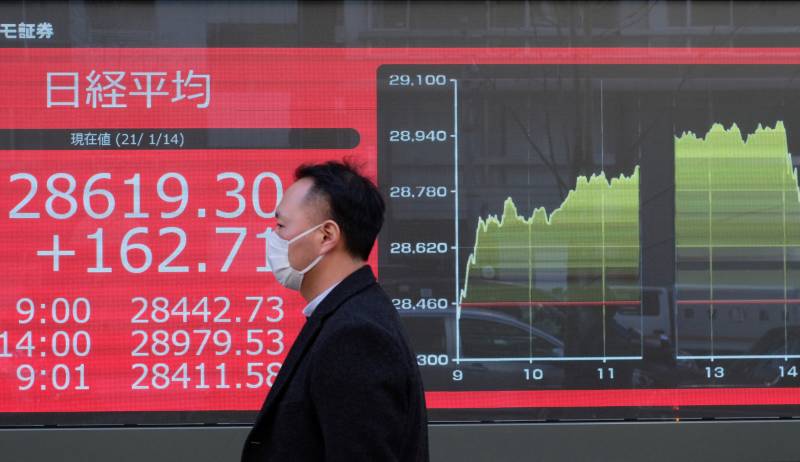Asian markets struggle after Biden unveils huge stimulus plan

Stay tuned with 24 News HD Android App

Joe Biden's $1.9 trillion stimulus proposal was met with a shrug in Asia Friday as observers said the massive spending spree had been largely factored into valuations, while profit-taking weighed on markets at the end of a broadly healthy week.
Reassurances from Federal Reserve boss Jerome Powell that record-low interest rates and loose monetary policy would remain in place for some time removed some lingering angst on trading floors, while there remains plenty of optimism about the long-term economic outlook.
Surging virus infections and deaths -- and the lockdowns they are forcing governments to impose -- are the main stumbling blocks for investors, despite the rollout of vaccines that could allow life to return to normal.
With days before he takes office, President-elect Biden unveiled his rescue package, which he said addressed "the twin crises of a pandemic and this sinking economy".
The plans include an extra $1,400 cash handout for individuals -- to top up the $600 in last month's stimulus -- a hike in the minimum wage to $15 an hour and billions of dollars to ramp up vaccinations so that 100 million are administered in 100 days.
There is also money for struggling state and local governments, the safe reopening of schools and an extension of unemployment benefits.
The need for more economic help was highlighted by data showing new applications for unemployment benefits rose by 181,000 last week, the biggest rise since the pandemic began in March.
Fed chief's reassurance
But analysts warned that while Democrats have control of Congress, the spending plans were far from guaranteed to get through untouched.
"Given the distaste Republicans have for state aid, Mr Biden's bipartisan hopes will be immediately tested," said OANDA's Jeffrey Halley. "We have no visibility from the Republican Senators about how bipartisan they will feel, if at all. The US Senate minority may yet filibuster the hopes of President Biden."
While welcomed by investors, the proposals failed to fire a surge in stocks, with Asian markets mostly down with analysts warning that some valuations maybe a little overdone and ripe for investors to cash in their profits.
Tokyo, Seoul, Mumbai, Taipei Manila, Jakarta, Bangkok and Wellington were all down, though Hong Kong and Singapore eked out gains while Sydney and Shanghai were barely moved.
"Seems like this was already priced in, at least as far as magnitude," said Ilya Spivak at DailyFX. "The main question is how much of it gets compromised away to get it passed. That is probably the next layer of speculative uncertainty that markets are focused on. Hence the muted response."
There is a worry that the bill could be jammed up in the Senate as lawmakers debate the impeachment of Donald Trump, which some observers say could also slow down confirmation hearings for Biden's cabinet picks.
There had been growing concern about the Fed's pledge to keep borrowing costs at record lows for as long as needed if any huge government spending spree puts upward pressure on inflation.
But while bank chief Powell on Thursday said he expected the economy to rally as people returned to their daily lives and habits, he did not think price rises would spike enough to warrant immediate action, while unemployment remained a key worry.
"If inflation were to move up in ways that are unwelcome, we have the tools for that and we'll use them," he said.
His comments were an "indication that the Fed's current ultra-easy policy setting will remain in place for the foreseeable future", said National Australia Bank's Rodrigo Catril.
Hong Kong-listed shares in Chinese smartphone giant Xiaomi plunged more than 11 percent in reaction to news the United States had blacklisted it after being classified by the Pentagon as a "Communist Chinese military" company.
The action means US investors will be unable to purchase Xiaomi securities and will ultimately have to divest down the line unless the order is overturned by Biden.
